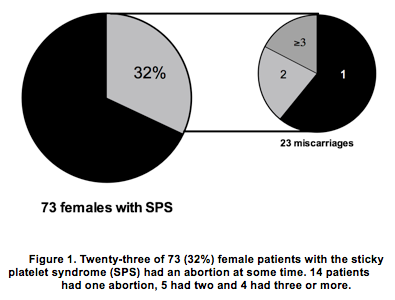PRIMARY THROMBOPHILIA IN MÉXICO XII: MISCARRIAGES ARE MORE FREQUENT IN PERSONS WITH THE STICKY PLATELET SYNDROME (SPS)
(Abstract release date: 05/18/17)
EHA Library. Ruiz Argüelles G. 05/18/17; 182932; PB2219

Guillermo Jose Ruiz Argüelles
Contributions
Contributions
Abstract
Abstract: PB2219
Type: Publication Only
Background
The sticky platelet syndrome (SPS) is an inherited condition which leads into arterial and venous thrombosis. There is scant information about the association between the SPS and obstetric complications.
Aims
To assess the relationship of the SPS and fetal loss in a single institution.
Methods
The obstetric history of all the consecutive female patients prospectively studied along a 324 month period, in a single institution with a history of thrombosis and a clinical marker of primary thrombophilia was reviewed.
Results
Between 1989 and 2016, 268 consecutive patients with a clinical marker of primary thrombophilia and a history of arterial or venous thrombosis were studied; of these, 108 were female patients. Within this subset of thrombophilic female persons, 77 (71%) had been pregnant at some moment. Twenty eight of these 77 patients (37%) had had a spontaneous abortion and 24 out of these (86%) were found to have the SPS. On the other hand, in a subset of 73 female patients with the SPS who had been pregnant, 32% had miscarriages. These figures are significantly higher than the prevalence of abortions in the Mexican general population of pregnant women, which is 12-13% (chi square = 7.47; p = 0.0063). Accordingly, the relative risk of having a miscarriage is 2.66 times higher in female patients with the SPS than in the general population (p = 0.0014 ).

Conclusion
In México, female patients with the SPS experience significantly more spontaneous abortions than the general population. Since the treatment of the SPS is simple and effective and could in turn prevent adverse obstetric outcomes, its investigation in women studied because obstetric complications may be useful and deserves further research.
Session topic: 34. Thrombosis and vascular biology
Keyword(s): Thrombophilia
Abstract: PB2219
Type: Publication Only
Background
The sticky platelet syndrome (SPS) is an inherited condition which leads into arterial and venous thrombosis. There is scant information about the association between the SPS and obstetric complications.
Aims
To assess the relationship of the SPS and fetal loss in a single institution.
Methods
The obstetric history of all the consecutive female patients prospectively studied along a 324 month period, in a single institution with a history of thrombosis and a clinical marker of primary thrombophilia was reviewed.
Results
Between 1989 and 2016, 268 consecutive patients with a clinical marker of primary thrombophilia and a history of arterial or venous thrombosis were studied; of these, 108 were female patients. Within this subset of thrombophilic female persons, 77 (71%) had been pregnant at some moment. Twenty eight of these 77 patients (37%) had had a spontaneous abortion and 24 out of these (86%) were found to have the SPS. On the other hand, in a subset of 73 female patients with the SPS who had been pregnant, 32% had miscarriages. These figures are significantly higher than the prevalence of abortions in the Mexican general population of pregnant women, which is 12-13% (chi square = 7.47; p = 0.0063). Accordingly, the relative risk of having a miscarriage is 2.66 times higher in female patients with the SPS than in the general population (p = 0.0014 ).

Conclusion
In México, female patients with the SPS experience significantly more spontaneous abortions than the general population. Since the treatment of the SPS is simple and effective and could in turn prevent adverse obstetric outcomes, its investigation in women studied because obstetric complications may be useful and deserves further research.
Session topic: 34. Thrombosis and vascular biology
Keyword(s): Thrombophilia
{{ help_message }}
{{filter}}


